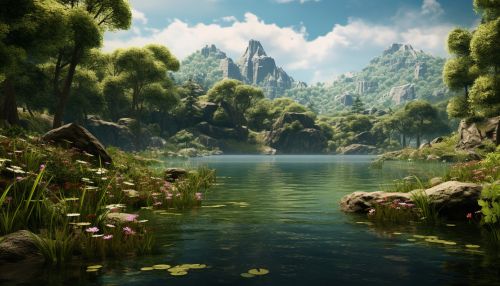Aquatic Ecology
Introduction
Aquatic ecology is a sub-discipline of ecology that studies the interactions between organisms and their aquatic environments. This field of study encompasses both marine and freshwater ecosystems, including oceans, seas, lakes, ponds, rivers, and streams. Aquatic ecologists aim to understand the dynamics of these ecosystems, the relationships between their biotic (living) and abiotic (non-living) components, and how they respond to natural and human-induced changes.


Aquatic Ecosystems
Aquatic ecosystems are broadly classified into two types: marine ecosystems and freshwater ecosystems. Marine ecosystems, such as oceans and seas, are characterized by high salinity levels, while freshwater ecosystems, including lakes, ponds, rivers, and streams, have low salinity.
Marine Ecosystems
Marine ecosystems cover approximately 71% of the Earth's surface and contain about 97% of the planet's water. They are home to a diverse array of species and are crucial for the global climate regulation and the water cycle. The marine ecosystem is divided into different zones, each with its unique physical conditions and biodiversity. These include the intertidal zone, pelagic zone, abyssal zone, and benthic zone.
Freshwater Ecosystems
Freshwater ecosystems, although covering only 0.8% of the Earth's surface, house approximately 6% of all known species. They are categorized into lentic ecosystems (still water, like lakes and ponds), lotic ecosystems (flowing water, like rivers and streams), and wetlands.
Biotic and Abiotic Components
Aquatic ecosystems are complex systems composed of biotic and abiotic components that interact with each other.
Biotic Components
Biotic components refer to the living organisms in an ecosystem. In aquatic ecosystems, these include a wide variety of plants, animals, and microorganisms. Organisms are often classified into trophic levels based on their role in the food web, including primary producers, consumers, and decomposers.
Abiotic Components
Abiotic components are the non-living factors that influence an ecosystem. In aquatic ecosystems, these include water, temperature, light, pH, salinity, and nutrients. These factors can significantly affect the distribution and behavior of organisms in an aquatic environment.
Aquatic Food Webs
Aquatic food webs describe the feeding relationships among organisms in an aquatic ecosystem. They start with primary producers, such as phytoplankton in marine ecosystems and algae in freshwater ecosystems, which convert sunlight into energy through photosynthesis. This energy then flows through the food web, from primary consumers (herbivores), to secondary consumers (carnivores), and finally to apex predators.
Aquatic Biogeochemical Cycles
Aquatic biogeochemical cycles involve the movement of elements, such as carbon, nitrogen, and phosphorus, between biotic and abiotic components of an ecosystem. These cycles play a crucial role in maintaining the health of aquatic ecosystems and can be significantly impacted by human activities.
Human Impact on Aquatic Ecosystems
Human activities have a profound impact on aquatic ecosystems. Pollution, overfishing, habitat destruction, and climate change are among the major threats to these ecosystems. Aquatic ecologists play a crucial role in studying these impacts and developing strategies to mitigate them.
Conservation and Management
Conservation and management of aquatic ecosystems involve a range of strategies aimed at protecting these ecosystems and their biodiversity. These include the establishment of marine and freshwater protected areas, restoration of degraded habitats, and sustainable fishing practices.
Conclusion
Aquatic ecology is a vital field of study that contributes significantly to our understanding of the world's aquatic ecosystems. By studying the complex interactions within these ecosystems, aquatic ecologists can help to inform conservation and management strategies, ensuring the health and sustainability of our planet's water bodies.
